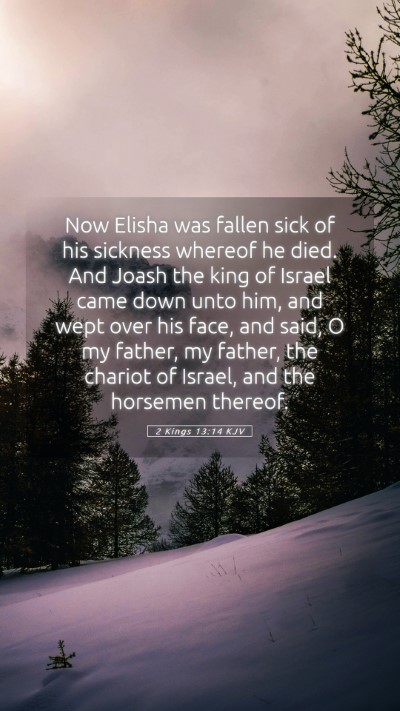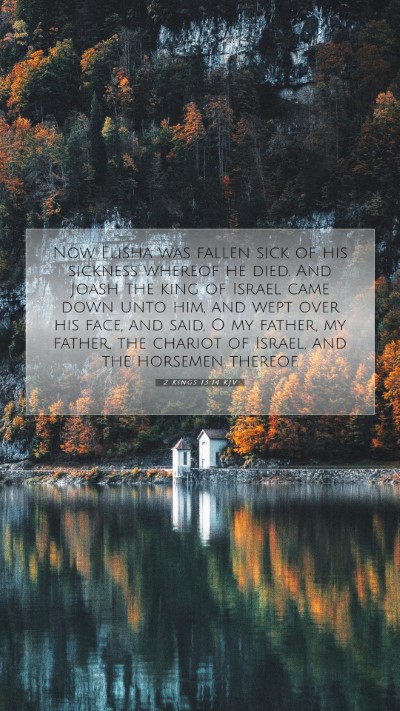Understanding 2 Kings 13:14
The verse 2 Kings 13:14 states:
"Now Elisha had become ill with the illness of which he would die. And Joash the king of Israel went down to him and wept over him, saying, 'My father, my father, the chariots of Israel and its horsemen!'"
This verse serves as a poignant moment in the narrative of Elisha’s life and ministry, reflecting on his relationship with King Joash of Israel. The insights into this scripture are enriched by interpretations from various public domain commentaries.
Verse Meaning and Commentary
The deeper meanings of this verse can be gleaned from the insights of Matthew Henry, Albert Barnes, and Adam Clarke. Below we summarize their perspectives:
1. Matthew Henry's Commentary
Matthew Henry notes that this passage depicts the end of Elisha's prophetic ministry and showcases the honor and affection that King Joash had for him. Joash’s lament reflects the significant loss of a spiritual leader and the chaos that would follow in Israel due to Elisha's absence. Henry emphasizes the importance of prophetic ministry and the anointing of leaders that guide nations.
2. Albert Barnes' Commentary
Albert Barnes interprets the king's phrases—particularly "the chariots of Israel and its horsemen"—as an acknowledgement of Elisha’s role in providing protection and guidance for Israel. Barnes suggests that Joash is expressing that the true strength of Israel lies not in physical armies but in the spiritual leadership and prophetic counsel that Elisha provided. This highlights a theme of reliance on divine support rather than mere militaristic power.
3. Adam Clarke's Commentary
Adam Clarke provides a detailed analysis on the emotional state of Joash in this moment. He sees the king’s tears as a sign of respect and desperation, underlining the relationship dynamics between the king and the prophet. Clarke adds that this indicates a recognition of the chaos Israel would face without Elisha's guidance. He further elaborates on the symbolism behind "chariots and horsemen," associating it with divine assistance as opposed to earthly might.
Historical Context
The historical backdrop of this verse is crucial for understanding its significance. During this period, Israel faced numerous threats from surrounding nations. The prophetic voice of Elisha was a stabilizing force during politically tumultuous times. His impending death symbolized not just a personal loss for Joash, but a potential downfall for Israel's sovereignty and spiritual direction.
Applications of 2 Kings 13:14
This verse can be applied in various aspects of modern life, particularly in the encouragement to seek spiritual leaders who guide us through life's challenges. The emotional bond between Joash and Elisha also serves as a reminder of the importance of mentorship and the value of recognizing the contributions of those who lead us spiritually.
Personal Reflection
The lament of Joash prompts personal reflection on the role of spiritual mentorship in our lives. As we encounter difficulties, we may find ourselves looking toward those who have provided wisdom and guidance. The passage encourages us to value such relationships while simultaneously advocating for an earnest approach in seeking God's guidance through prayer and scriptural insight.
Related Scriptures
- 2 Kings 2:12 - Elisha succeeds Elijah, emphasizing the prophetic legacy.
- 2 Kings 6:17 - The spiritual support available to God’s people illustrated through Elisha's vision of heavenly armies.
- 2 Kings 4:27 - The portrayal of Elisha’s deep connections with those he serves.
Conclusion
In conclusion, 2 Kings 13:14 encapsulates a pivotal moment reflecting profound love, the weight of prophetic authority, and the consequences of spiritual loss. The commentaries of Matthew Henry, Albert Barnes, and Adam Clarke together enhance our understanding by offering diverse insights that apply not only to the history of Israel but also to our own lives today. Emphasizing the importance of recognizing spiritual leaders and their roles in our lives, this passage invites us to think deeply about our own reliance on God and His guidance through appointed leaders.


